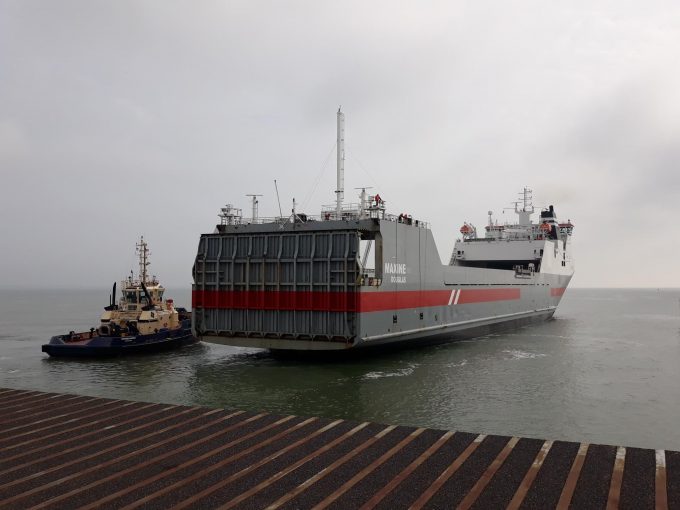Maersk appoints John Wetherell to head its global airfreight forwarding
Maersk has appointed John Wetherell (above) as its global head of airfreight forwarding. It is ...

Ro-ro services through the US east coast are set for months of delays, following the accident that claimed the lives of six people and destroyed a Baltimore bridge.
Carriers, including Hapag-Lloyd and Maersk, have suspended bookings to the Helen Delich Bentley Port of Baltimore, while a K-Line chartered car-carrier and another belonging to Wallenius Wilhelmsen are marooned at the port while authorities work to clear the blockage.
Metro Shipping advised customers it was “unknown how long the port will be cut off due to the incident”, but warned that “any length of downtime will greatly impact ro-ro capacity into the US east coast, as well as cause additional congestion at alternative ports that will need to take on the overflow of ocean containers that would naturally route through Baltimore”.
That overflow looks to be significant, with BLG Logistics having told German outlet DLZ it has 2,800 cars destined for Baltimore waiting at Bremerhaven, alone.
It is understood that the logistics operator still plans to send a few via Baltimore, with the rest being rerouted via Brunswick in Georgia.
Patrick Lepperhoff, principal of the Inverto consultancy, said it was German carmakers that had particular interest in the Baltimore gateway.
“The major German car manufacturers operate their own terminals there, although only the Mercedes-Benz facility is blocked by the collapsed bridge, the Volkswagen and BMW terminals can still be accessed,” added Mr Lepperhoff.
Unlike Metro, however, he claimed the blocked port would have little impact on trade between the US and Europe. He noted: “In the last quarter of 2023, around 260,000 standard containers were loaded and unloaded at the port. These can be diverted to neighbouring ports like New York and Norfolk. For these ports, this means around 10% higher volumes, the harbours should have the capacity.”
However, Mr Lepperhoff’s assessment may be in the minority, with not only Metro but a series of consultancy and industry groups have warned the fallout from the disaster would be substantial.
Russel Group has suggested some $8bn in trade may be lost as a consequence of the damage to the bridge, with its marine division calculating that it will take six weeks to get services back on track.
Metro said: “Baltimore is one of the largest ro-ro ports for global vehicle movements into and out of the US east coast.
“Carriers have advised of diversions and avoidance of the port for the foreseeable future. We anticipate there will be consequential effects on vessel rotations and schedules ongoing to and from Europe and vehicle compounds at alternative ports will become congested.”
The chaos follows a 2M box ship with two pilots aboard crashing into a support pylon of the Francis Scott Key Bridge in Baltimore, Maryland, in the early hours of Tuesday morning.
Eight construction workers tending to the bridge were among 20 people plunged into the water as it collapsed into the Patapsco River, of those, six were declared officially dead several hours later. Two of the bodies were recovered this morning.
Confirming it too had suspended services to the port, Hapag-Lloyd said that “Our thoughts are with those who have been affected,” noting it would provide updates when available.
For Wallenius Wilhelmsen, it is also contending with the issue of its vessel the M/V Carmen being trapped in the port as a result of the Maryland Port Administration suspending vessel traffic in and out of Baltimore until further notice.
A spokesperson for Wallenius told The Loadstar: “First and foremost, our sympathies go to all of those directly affected by the collapse of the Francis Scott Key Bridge in Baltimore.
“We are currently working with various port authorities, partners, and stakeholders to assess potential alternative solutions to help minimize the effect this situation will have upon our customers and ongoing operations.”
Meanwhile, Singapore’s Maritime and Port Authority (MPA) is investigating the possibility of the Singapore-flagged Dali involved being in breach of the Merchant Shipping Act.
Comment on this article